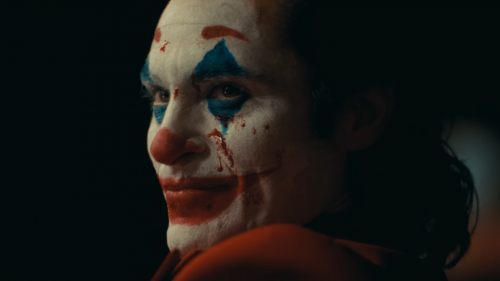Which 2020 Best Adapted Screenplay Nominee Is The Best Adaptation?
Another year, another set of Oscar nominees. And like every year, I once again endeavor to judge which of the nominees for Best Adapted Screenplay is the truest to the source material. I don’t do this out a sense that the most faithful adaptation makes for the best film. On the contrary, I find that the truest adaptations rarely get nominated for anything, because recognition of what works on film as opposed to what works on the page or the stage is at the heart of any good adaptation, so of course there will be transformative differences in any good adaptation. In fact, you’ll find the same is true of this year’s nominees, for even the most faithful adaptations listed below take some liberties to create a wholly unique experience. So without further ado, here are the rankings for the best adaptations among the adapted screenplay nominees.

Joker
Joker is a problematic addition to this list, not for its contents (though we could certainly talk about that another day), but because it isn’t really an adaptation of a pre-existing story. There is no Batman story that Joker is aiming to retell or redevelop. In terms of narrative structure, Joker is much closer to Taxi Driver and The King of Comedy, but it is more homage than remake. The closest Joker comes to emulating any Batman source material is by taking tonal elements from Alan Moore’s The Killing Joke, which features an origin story for The Joker that is itself questionable in its canonicity but is widely accepted as a probable beginning for the Clown Prince of Crime. But even if we take this to be the source text, there aren’t many similarities between the stories other than the premise that The Joker was a struggling comedian. The period aesthetics are different, the details of Joker’s descent into madness are different, and the name Arthur Fleck appears nowhere in the comic. Beyond being about pathetic men who are transformed by the bad luck of their lives, Joker and The Killing Joke are about as different as can be, but that’s still as close as Todd Phillips’ film comes to being a true adaptation.

The Two Popes
To call Anthony McCarten’s screenplay for The Two Popes an adaptation of Anthony McCarten’s nonfiction book The Pope is almost a complete absurdity. So far as I can tell, the two works were written concurrently, and the contents of the book are merely the formatted findings of McCarten’s research done in order to draft the screenplay. What’s more, the two works are shockingly disparate from one another in terms of content. The book is a holistic history of Popes Benedict and Francis, including Benedict’s resignation and Francis’ reformist teachings in contradiction of Benedict’s orthodoxy, but it never hints at the meeting of minds that the film posits as its central conceit. The film makes a point of depicting Francis as in continuity with Benedict’s papacy, despite their political differences, but the book portrays their relationship is publicly loving but quietly adversarial. The film is a radical transformation of a history depicting two flawed yet sympathetic individuals into a feel-good story of liberals and conservatives finding middle ground, so it’s a wonder that the two works were written by the same man in the same year. Unless the book purposely left out the events depicted in the film, those events are entirely suppositional and not based on actual events, but either way, it makes the two works entirely distinct so as to make the film’s status as an adaptation laughable.

Jojo Rabbit
Jojo Rabbit is a fascinating adaptation of Christine Leumens’ novel Caging Skies, because it seems as though Taika Waititi opted to create the story he wished he had read instead of the story he reportedly quit reading halfway through. The screenplay deviates from the first half of the book in an extreme number of ways, most notably in how Johannes comes to be disfigured, the use of the nickname “Jojo,” the extremity of Johannes’ injuries, the fact that Jojo does not age in the film while the book follows the boy to adulthood, and, most tellingly, the inclusion of Hitler as an imaginary friend. The tones of the two works are entirely different, as Leumens’ book is mostly humorless and relatively hopeless in how it portrays Johannes’ growth into being a man. This is best shown by what Waititi left out of his comedic take on the material. Jojo Rabbit ends with the Allies winning the war against Germany, Jojo lying to the hidden Elsa about a German victory, and Elsa immediately discovering this to be a lie, but that lie happens much earlier in the book, and Elsa does not immediately discover its falsity. In fact, the entire second half of the book is about Johannes lying to Elsa about a world of German supremacy because he has no family, resources, or political power left except for that which he exerts over this Jewish woman he holds captive. It’s a dark, depressing story about how Nazi ideology warped and destroyed a boy so that he could never fully mature into a responsible adult capable of love. That’s a far cry from what eventually became Jojo Rabbit, but you can still see the bones of Leumens’ story within the satirical fat of Waititi’s reimagining.

Little Women
Greta Gerwig’s adaptation of Little Women is a very faithful recreation of Louisa May Alcott’s original novel, but it differs in some pretty drastic ways for the purpose of creative license. The most obvious is Gerwig’s use of anachronistic storytelling, jumping between past and present to highlight parallels that were present in the original novel and in other adaptations, but here emphasizing those moments rather than leaving that dissection entirely to the viewer. This arguably pulls dramatic weight from some later events in the narrative, but it also gives us greater empathy for Amy March, many readers’ least favorite March sister and now the favorite of many moviegoers. The biggest narrative change, however, is to the ending, which plays with the idea that Jo March is the author of the in-universe version of Little Women and included Alcott’s original ending as a bargaining chip with her publisher. In the real events of this version, Jo ends up childless and unmarried but contented with having published her work. It’s actually a brilliant bit of sleight of hand on Gerwig’s part to make both hers and Alcott’s endings somewhat canon from a certain point of view, but even if we accept that Gerwig’s version of the real Jo's ending is closer to what Alcott would have originally wanted to be published, that interpretation still isn’t entirely faithful to the original text.

The Irishman
The interesting thing about Steven Zaillian’s screenplay for The Irishman, as an adaptation, is that it is very close to Charles Brandt’s I Heard You Paint Houses in terms of events and structure, as both the film and the book recount the events of Frank Sheeran’s life as the man described it to Brandt, wholly with credence to the accuracy of Sheeran’s account regardless of whether anything he says could be verified. Though certain details of Sheeran’s claims have been left out, most notably his involvement with the JFK assassination and, more importantly, a boxing match he claims to have had with a kangaroo, the details of his involvement with Jimmy Hoffa and his eventual assassination are largely identical. What makes The Irishman different, though, is in what it adds. I Heard You Paint Houses is primarily focused on Sheeran’s interpretation of his own life, but Scorsese’s film strips away any sense of fun and sits with a profound regret that doesn’t permeate Brandt’s book. Where the book is the story of a life lived, the film is the story of a life wasted, ultimately coming across as more tragic for the beats it emphasizes. Relatively, it’s probably the most faithful adaptation nominated this year, but it departs from the original intent of Sheeran's role as storyteller in fascinating ways.



